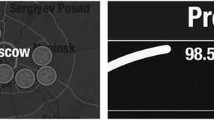
Overview
- Provides a bridge between traditional and critical approaches in security studies
- Presents a complex theoretical background for securitisation studies
- Applies the theoretical model in an empirical case study
Part of the book series: Contributions to International Relations (CIR)
Access this book
Tax calculation will be finalised at checkout
Other ways to access
About this book
This book offers a model for understanding securitization in terms of hegemonic discourse formations. It re-thinks the very meaning of security as well as the relationship between the understanding of security in traditional and critical approaches in security studies to find a common denominator between them. Deduced firmly from realist political philosophy and its analytic categories, such as state-based sovereignty, security is presented as a function of discursive formations. Providing a sound discourse-theoretical foundation which includes both linguistic and non-linguistic practices as well as a focus on relationships of power, the book offers a basis for the integration of insights generated by the different approaches to securitisation, and enhances the analytical and explanatory depth of the concept.
As part of its theoretical foundation, the book further presents a fundamentally new image of long-standing theoretical and conceptual challenges within speech-act inspired approaches, including the re-formulation of central analytical categories such as the speaker-audience-context nexus. By explaining securitisation as signifying the boundaries of the construction of meaning, it presents an original understanding of securitisation, which is deeply integrated into the structures of the social construction of meaning. On this basis, the book offers a new understanding of successful securitisation factors and insights into aspects that render specific objects more or less likely for securitisation. The book proceeds to discuss two central aspects of the securitisation debate: The constitution of power, as well as an exploration of the nature of the political and politicisation. An empirical case study on the development-security-nexus offers further insights into the applicability of the theoretical model.This book will appeal to students, researchers, and scholars of political science and international relations (IR) interested in a better understanding of IR theory, realism, critical security studies, and discourse analysis.
Similar content being viewed by others
Keywords
Table of contents (6 chapters)
Authors and Affiliations
About the author
Hannah Broecker is a lecturer at the Department of Media and Communication Studies at the Ludwig-Maximilians-University in Munich (Germany). Previously, she has worked and taught on issues of international security studies at the Collaborative Research Centre ‘Dynamics of Security’ of the Universities Marburg (Germany) and Gießen (Germany), as well as at the University of Stuttgart (Germany). She has also been engaged with issues of international security and development at the Peace Research Institute Frankfurt (PRIF, Germany), the African Development Bank (Uganda), and the Friedrich-Ebert-Foundation (Nigeria and UK).
Bibliographic Information
Book Title: Securitisation as Hegemonic Discourse Formation
Book Subtitle: An Integrative Model
Authors: Hannah Broecker
Series Title: Contributions to International Relations
DOI: https://doi.org/10.1007/978-3-031-16206-0
Publisher: Springer Cham
eBook Packages: Social Sciences, Social Sciences (R0)
Copyright Information: The Editor(s) (if applicable) and The Author(s), under exclusive license to Springer Nature Switzerland AG 2022
Hardcover ISBN: 978-3-031-16205-3Published: 26 October 2022
Softcover ISBN: 978-3-031-16208-4Published: 27 October 2023
eBook ISBN: 978-3-031-16206-0Published: 25 October 2022
Series ISSN: 2731-5061
Series E-ISSN: 2731-507X
Edition Number: 1
Number of Pages: XI, 239
Topics: International Security Studies, International Relations Theory, Development Studies, Political Communication, Political Science



